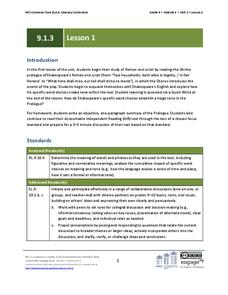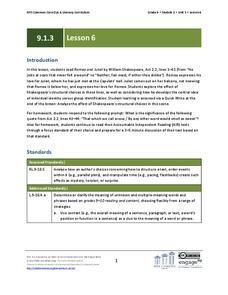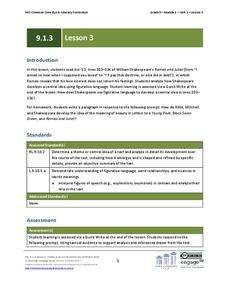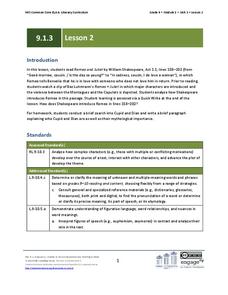EngageNY
Grade 9 ELA Module 1: Unit 3, Lesson 1
Class members begin their study of Romeo and Juliet by examining the words Shakespeare chooses in the Prologue to Act I to create the tragic tone of his famous play about star-crossed lovers.
EngageNY
Grade 9 ELA Module 1: Unit 3, Lesson 9
After viewing Baz Luhrmann’s depiction of Romeo and Juliet's marriage, the class listens to a recording of Act 3, Scene 1, lines 59–110. Then, groups consider how Shakespeare develops Romeo’s character through his interactions with...
EngageNY
Grade 9 ELA Module 1: Unit 3, Lesson 15
Where does Friar Laurence's loyalty lie? After listening to a reading of Act 4, scene 1, lines 89-126 of Romeo and Juliet, groups examine the details of Friar Laurence's plan.
EngageNY
Grade 9 ELA Module 1: Unit 3, Lesson 5
Class members continue their study of Romeo and Juliet by watching scenes from Baz Luhrmann’s Romeo + Juliet and then examining the figurative language Shakespeare uses in Act 1, scene 5, lines 92–109 when Romeo and Juliet meet at the ball.
EngageNY
Grade 9 ELA Module 1: Unit 3, Lesson 6
The balcony scene from Romeo and Juliet takes center stage as class members consider the structural choices Shakespeare makes, i.e., having Romeo appear first in the scene and having Juliet appear unaware that Romeo is listening to her...
EngageNY
Grade 9 ELA Module 1: Unit 3, Lesson 13
Readers examine the conversation between Friar Laurence and Romeo in Act 3, scene 3 of Romeo and Juliet and consider how Shakespeare's word choices impact the development of Romeo's character.
EngageNY
Grade 9 ELA Module 1: Unit 3, Lesson 11
The study of Romeo and Juliet continues as pairs use the provided summary tool worksheet to record evidence of how Shakespeare uses dramatic irony to heighten the tension in Juliet's soliloquy in Act 3, scene 2, lines 1–31.
EngageNY
Grade 9 ELA Module 1: Unit 3, Lesson 3
Class members listen to a masterful reading of Act 1, Scene 1, lines 203-236 of Romeo and Juliet and then break into groups to examine how Shakespeare uses figurative language to develop Romeo's idealized concept of beauty.
EngageNY
Grade 9 ELA Module 1: Unit 3, Lesson 7
How does Shakespeare use dialogue to develop the idea that the star-crossed lovers are more concerned with their relationship as individuals than they are with their roles as children of warring families? That is the question facing...
EngageNY
Grade 9 ELA Module 1: Unit 3, Lesson 14
After watching the scene from Romeo + Juliet in which Juliet argues with her parents because she does not want to marry Paris, groups do a close reading of Act 4, scene 1, lines 44-88, examining the word choices in the conversation...
EngageNY
Grade 9 ELA Module 1: Unit 3, Lesson 18
Why is Romeo and Juliet considered a tragedy? Class members conclude their reading of the play, focusing on the final lines of Act 5, scene 3. They also consider how Shakespeare structures the text, orders events, and manipulates time to...
EngageNY
Grade 9 ELA Module 1: Unit 3, Lesson 17
Romeo and Juliet, Act 5, Scene 3, lines 139-170, is the focus of this day's lesson plan. Readers examine the dramatic irony in Juliet's comments and consider how "lamentable chance" caused by a "greater power" plays a role in the tragedy.
EngageNY
Grade 9 ELA Module 1: Unit 3, Lesson 19
To prepare for the unit's final assessment essay, class members collaborate to find evidence that reveals Romeo and Juliet as tragic heroes.
EngageNY
Grade 9 ELA Module 1: Unit 3, Lesson 4
Class members watch the clip of Baz Luhrmann’s Romeo + Juliet in which Benvolio persuades Romeo to go with him to the Capulet ball to see Rosaline. Pairs then examine Act 1, scene 3, lines 64–100, and consider how Shakespeare develops...
EngageNY
Grade 9 ELA Module 1: Unit 3, Lesson 16
"Thus, with a kiss, I die." After viewing a film clip of the events leading up to Romeo's suicide, class members analyze Act 5, scene 3, lines 88-120, in which Romeo drinks the apothecary's poison.
EngageNY
Grade 9 ELA Module 1: Unit 3, Lesson 20
The final session in this 20-lesson plan unit asks individuals to use their Quick Writes, discussion notes, worksheets, and annotated text to craft and support a claim about how Shakespeare develops either Romeo or Juliet as tragic heroes.
Star Wars in the Classroom
"Shakespeare and Star Wars": Lesson Plan Day 1
"Now is the summer of our happiness/Made winter by this sudden, fierce attack!" Luke Skywalker meets Hamlet in a 10-instructional activity unit based on Ian Doescher's William Shakespeare's Star Wars: Verily, a New Hope. Using Star...
EngageNY
Grade 9 ELA Module 1: Unit 3, Lesson 2
After viewing a clip from Baz Luhrmann’s Romeo + Juliet in which major characters are introduced, and the violence between the Montagues and the Capulets is depicted, the class reads Act 1, Scene 1, lines 158-202. Groups then analyze the...
EngageNY
Grade 9 ELA Module 1: Unit 3, Lesson 10
"O, I am fortune's fool!" As they continue their analysis of Act 3, scene 1, class members consider the role of fate in the events. The lesson plan concludes with a viewing of a brief portion of Baz Luhrmann’s Romeo + Juliet, in which...
Curated OER
Scene Writing: Literacy and Playwriting
Drama is ever-present in our daily lives and eloquently depicted on stage. Middle schoolers practice writing scenes based on different prompts and frameworks, and then perform those creative scenes for their classmates. The...
Curated OER
"Romeo and Juliet" English Lesson Plans
English lesson plans focusing on "Romeo and Juliet" can be a great way to introduce students to Shakespeare's plays.
Curated OER
"Here's much to do with hate, but more with love": The Prologue in Romeo and Juliet
Students participate in a guide close reading of the Prologue to Romeo and Juliet. They write a prologue sonnet to another piece of literature they have read.
Curated OER
Mixing it up with Romeo and Juliet
Students create a soundtrack for Romeo and Juliet choosing one song to represent each scene. They write a paragraph explaining their song choices.
Curated OER
A Plague on Both Your Houses: a Romantic Guide To Transgression
What are the roles within your family, culture and society as well as the personal and societal consequences of transgressing them? To explore this question, class members look at long-held traditions, examples in literature...

























